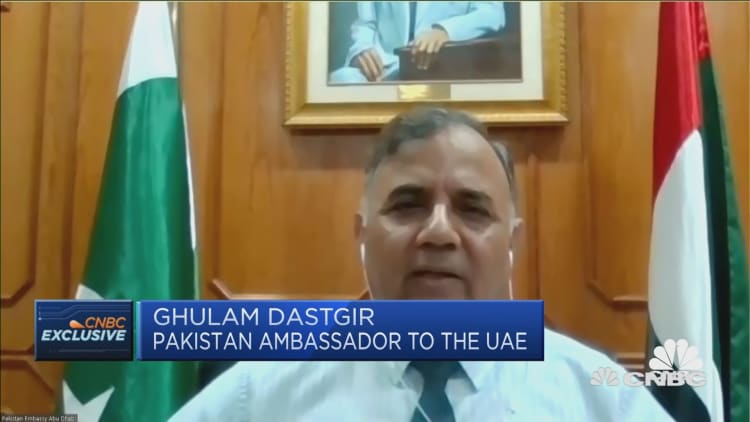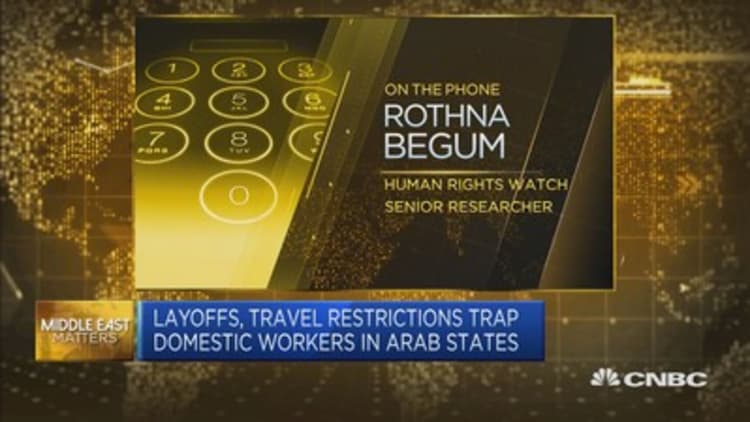
Pakistan, like many developing countries, receives billions of dollars annually in the form of remittances — money from migrant workers overseas sent back to family members and friends. With swathes of these workers being laid off and sent back home, that important revenue stream is taking a significant hit, Pakistan's Ambassador to the UAE Ghulam Dastgir told CNBC's Dan Murphy on Wednesday.
"We have 1.6 million Pakistanis living in the UAE and as a result of this pandemic, many companies have closed down the shops," Dastgir said. "Roughly 40,000 to 50,000 people have been laid off and they have gone back to Pakistan."
The numbers are massive: 20% of the UAE's majority-expat population is Pakistani, and in a typical year the South Asian nation of 212 million receives $4.6 billion in remittances from the UAE alone.
"We foresee that the remittances will go down," Dastgir said. The exact figure is hard to say, he added, but he expects remittances to fall "around 5-10%."
There is also an additional risk to remittances for some countries. In April, the UAE said it was "studying measures" to restrict labor relations with some of the migrant workers' home countries that were not cooperating with coronavirus evacuation procedures. It said these could include "restrictions or quotas for future recruitment."
Globally, the World Bank expects remittances around the world to take a 20% hit this year. During a normal year, the countries with the largest remittance inflows are India with $79 billion annually, China with $67 billion, Mexico receiving $36 billion, the Philippines with $34 billion and Egypt at $29 billion. The pandemic is dramatically reducing those numbers, though the full impact will only be realized months from now.
A whopping 50% of Pakistan's remittances come from the wider Gulf Cooperation Council states, which have built booming cities with modern infrastructure in a relatively short time thanks to cheap labor primarily from South Asia — something long criticized by human rights groups.
In the UAE, which has a population of 9.6 million, the largest expat groups are the ones that provide the majority of this labor: in 2018, Indian nationals accounted for 2.62 million of the UAE's residents, there were just over half a million Philippines nationals and 700,000 Bangladeshis.
Workers in dangerous positions
However, although people from these countries participate in every sector of the oil-rich Gulf states' economies and span a range of income levels, a high number have faced precarious conditions during the coronavirus crisis. Many have been sent home without their owed salaries, rights groups say.
At the height of the GCC's lockdowns, overcrowded living conditions contributing to clusters of coronavirus cases in migrant worker areas. Dastgir described a supportive relationship with UAE authorities in responding to the medical crisis.
"Right from the beginning, we had a very close coordination with the UAE authorities, they in fact opened some facilities in (areas) like Mussafeh, which is a concentrated area of industrial workers. They had a facility out for testing people for 10,000. We were in touch with the local authorities and these tests were provided free of cost," Dastgir said. He added that the Pakistani embassy and consulate provided "free-of-cost medical facilities to those who are really in need and those who are not able to afford it."

Researchers from advocacy groups Human Rights Watch and Amnesty International paint a different picture. Their reports have highlighted late and withheld pay, overcrowded living conditions and lack of support as risks to migrant workers that have only worsened during the pandemic.
Dastgir didn't allude to this; rather, he said that UAE authorities "frequently visit these labor camps and we try to ensure that our people are treated well." So far, the ambassador said, "we are not having any difficulty, not having any problem with them."
As for the remittances, Dastgir was hopeful that the UAE would welcome Pakistani workers back once the economy recovers.
"I do hope that those who have gone back to Pakistan, they will have an opportunity to be here," he said. "We have very well-trained I.T. people. We have likewise in other professions, we have doctors, engineers in Pakistan. So I do hope that whatever the loss we have … our people will again be coming back to the UAE."


